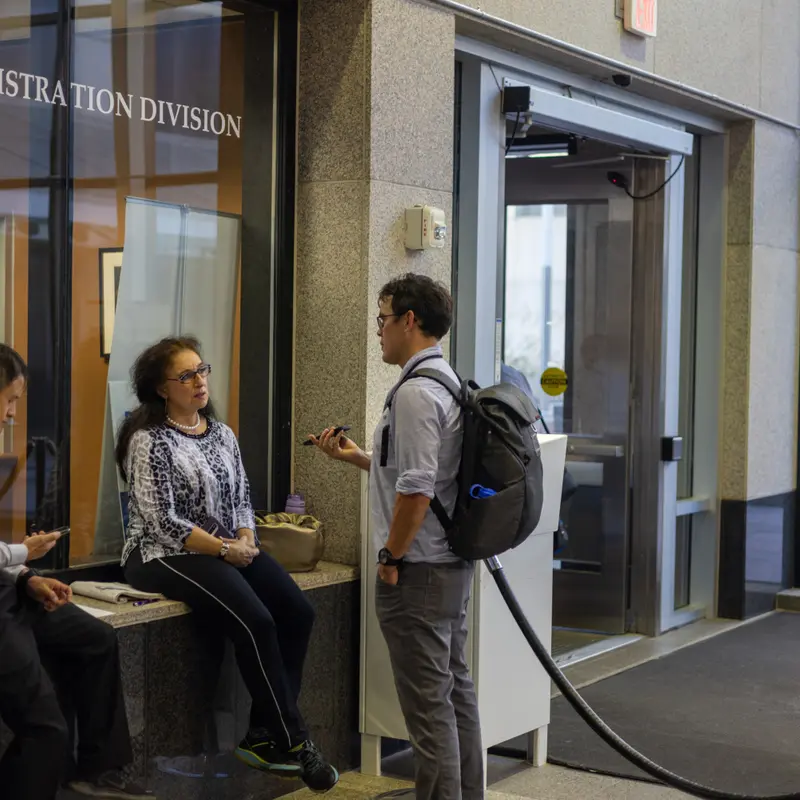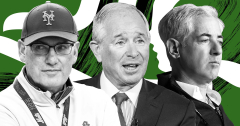ProPublica is a nonprofit newsroom that investigates abuses of power. Sign up to receive our biggest stories as soon as they’re published.
Reporting Highlights
- Tax Dodge: Most working Americans have to pay Medicare taxes, but some of the richest figures on Wall Street have found a way to opt out, a ProPublica investigation found.
- Accidental Loophole: Nearly 50 years ago, Congress tried to fix one financial abuse but unwittingly created an obscure loophole that these billionaires exploit to avoid Medicare taxes.
- Battling Abuse: The IRS only recently got tough on people it viewed as abusing the loophole, but it is unclear if the agency will be able to end the practice.
These highlights were written by the reporters and editors who worked on this story.
For most working Americans, paying their share of the taxes that fund Medicare is an unavoidable fact of life. It’s so automatic for many workers that they may not even realize it takes a bite out of every paycheck. In theory, everyone is required to contribute to the country’s health insurance program for seniors, no matter how poor or rich, from cashiers to CEOs.
Not on Wall Street. There, some of the most powerful people in finance found a way to opt out.
The trove of tax records behind ProPublica’s “Secret IRS Files” series contains plenty of examples of billionaire financiers who avoided Medicare tax despite earning huge amounts from their companies. In 2016, Steve Cohen, the owner of the New York Mets, paid $0. So did Stephen Schwarzman, head of the investment behemoth Blackstone. Bill Ackman, the headline-grabbing hedge fund manager, was able to shield almost all his income from the tax.
How do they do it? Business owners, like any self-employed person, whether they’re a freelance Uber driver or a hedge fund manager, have the responsibility to declare their self-employment earnings on their tax returns. Indeed, the vast majority of small-business owners have no choice but to do so and pay the same taxes that wage earners pay, including Medicare.
But high-priced tax advisers, wielding a once-obscure bit of the tax code, found a way to make that obligation vanish. By carefully channeling profits through a company in a way that invokes that obscure provision, even a Steve Cohen, with a tax return showing he received hundreds of millions in profits from his hedge fund, can exempt that income from Medicare tax.
The three billionaires contacted for this article said they followed the law as written. They also pointed to the fact that they paid substantial income tax, which for them carries a much higher rate. Medicare tax is 2.9% for most people and 3.8% for high earners.
But these maneuvers by the rich hasten Medicare’s future crisis. Sometime in the 2030s, the program’s trust fund is due to run dry. Closing the loophole, along with eliminating other ways around the tax for wealthy business owners, could raise more than $250 billion over 10 years for Medicare, according to recent government estimates.
Good journalism makes a difference:
Our nonprofit, independent newsroom has one job: to hold the powerful to account. Here’s how our investigations are spurring real world change:


The Supreme Court created its first-ever code of conduct after we reported that justices repeatedly failed to disclose gifts and travel from the ultrawealthy.



Support ProPublica’s investigative reporting today. Donate Now
We’re trying something new. Was it helpful?
Over the past three years, ProPublica has mined the tax records of the rich to detail the many ways they avoid taxes. We’ve focused on basic structural features of the U.S. system that advantage them. We’ve uncovered maneuvers of questionable legality that seem to have escaped the notice of the IRS. The Medicare tax loophole occupies a gray area. The IRS definitely knows about it, but it’s unclear if the agency will be able to stop it.
The potential of the loophole first surfaced in the 1990s, and the IRS soon expressed the view that active business owners shouldn’t be allowed to exploit it. It was only in recent years, however, that the agency got tough. Today, the IRS continues to battle what it considers a serious abuse, waging a rare, long-shot campaign to prevent some of the nation’s wealthiest citizens from using the loophole.
The story of how America’s richest financiers avoid paying Medicare tax gives unique insight into the peculiar, messy way taxes work in the U.S. No one set out to create the loophole when it first entered the tax code in 1977. But a series of seemingly unrelated policy changes, together with a revolution in how American businesses are structured, conspired to deliver a major tax advantage to the wealthy. On Capitol Hill, interest groups have successfully defended that advantage, branding any effort to close the loophole as a tax hike on Main Street businesses.
Approaching its 50th birthday, the loophole, for now, lives on.
Fixing One Problem, Creating Another
Over the 2010s, years of budget cuts sliced deep into the IRS’ enforcement muscle. Audits, especially those of the wealthy and corporations, plummeted. In response, agency leaders decided to conduct a kind of triage and focus the IRS’ dwindling might on the most pressing and addressable problems. Among the agency’s early priorities was to curb the widespread use of the Medicare tax loophole.
Beginning in 2018, the agency began hunting for business owners who, in its view, were abusing the law. It launched over 80 audits aimed at hedge funds, private equity firms, consultancies and similar businesses. Cohen’s firm was just the sort of thing the agency was looking for.
Before Cohen became popular as the approachable, gap-toothed, sweater-wearing Mets-fan-in-chief, he was a controversial figure on Wall Street, the inspiration for the legal-risk-taking hedge fund lead character in the Showtime series “Billions.” Cohen made his fortune through his original hedge fund, SAC Capital, known for rapid-fire trades with a remarkable track record. In 2013, SAC pleaded guilty to five criminal counts of securities and wire fraud, agreeing to pay $1.8 billion in penalties and effectively shut itself down. Cohen was not personally charged. Turning the page, he soon formed a new hedge fund, Point72.
The IRS’ audit of Point72 focused on one thing: how the profits had flowed to Cohen. In 2015, his firm earned $125 million from clients, and the money was routed to him through Point72 Asset Management LP.
Those last two letters, which stand for limited partnership, were Cohen’s key to accessing the loophole.
For most of the last century, before hedge funds and private equity firms dominated Wall Street, limited partnerships played a very specific role. They allowed investors, as limited partners, to buy into a business — often oil drilling or real estate development — without the usual risks of ownership like being pursued for the business’s debts.
But by the 1970s, creative uses of limited partnerships proliferated. One variety caught Congress’ attention. Government employees were covered by public pensions and thus were not eligible for Social Security, but brokerages were pitching these employees on limited partnerships as a way around that. The government workers could buy a small share of a business and receive self-employment income that qualified them for future Social Security benefits.
The scheme was condemned by both parties. After all, Social Security was meant to reward people’s labor, not their investments. Only income earned by someone actively running a business should count toward Social Security.
The solution, Congress decided, was to exclude most income earned by limited partners. It wouldn’t count toward self-employment income and, as a result, wouldn’t be subject to self-employment tax, which goes to Social Security and Medicare. As part of a major 1977 Social Security reform bill, this soon became the law.
It seemed like an easy fix. At the time, limited partners were, as a rule, passive investors. The line between the two types of partners that made up a limited partnership was real: General partners ran the business, and limited partners didn’t.
“Limited partners were historically forbidden under state law from getting too involved in the business,” said Susan Hamill, professor of law at the University of Alabama. “If they got involved at all, they would simply be treated as general partners, and the liability shield would be stripped away from them.”
Lawmakers assumed things would continue as they’d always been. They didn’t. The 1977 law, it turned out, had passed at the dawn of a new age, one where limited liability became standard for business owners, not a special condition with strings attached.
A new business structure, the limited liability company, exploded in popularity in the ’90s. LLCs limited the legal liability of all owners regardless of their role. Limited partnerships morphed into something that functioned similarly. After the change, the fact that someone was a limited partner said nothing about what they did for the business. They could be the CEO or a passive investor. It became common for owners to serve as both limited and general partners.
In this new world, the 1977 law was no longer a narrow exclusion. It was a broad grant of tax avoidance to anyone with a canny tax adviser.
Point72 Asset Management LP was part of the trend.
To take advantage of the loophole, Cohen needed to channel his firm’s profits through a limited partner before the money reached him.
One obstacle, it might seem, was that Cohen was one person. How could he partner with himself? That part was simple. A partnership requires at least two partners, but they can be companies or people. Cohen created two business entities, each wholly owned by him. One became the limited partner, the other the general partner.
Over 2015 and 2016, Point72 Asset Management earned $344 million in profits; 99.98% of that went to the limited partner and was declared exempt from Medicare tax. While those profits were subject to the 40% income tax rate (as much as $136 million in tax), Cohen’s returns showed $0 in self-employment income both years, helping him avoid up to $11 million in Medicare tax.
The IRS audited those returns and determined that the full $344 million was self-employment income. Last year, Point72 challenged that finding in court in a case that continues to this day. A spokesperson for Cohen declined to comment, citing the ongoing litigation.
“A Nasty Little Tax Increase”
Almost as soon as LLCs began their rapid spread, IRS officials recognized the possibility of widespread avoidance of self-employment tax. The problem became more urgent after 1993. Since its beginning, Medicare tax had, like Social Security, been capped. But Congre





